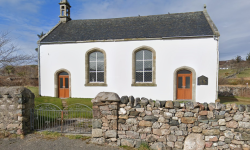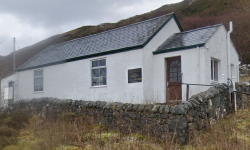James Ross, Durness
From the Free Church of Scotland Monthly Record of June 1892, p.150.
Mr. Ross was born in 1816 at Kirkhill, Inverness-shire. His father was schoolmaster there, and died when he was but eleven years of age. This bereavement of his early life, and the responsibilities it threw upon him as the only son of his widowed mother, were the means under God’s hand of leading him at this early period to give himself to the Lord Jesus. To show how unreservedly he did this, it requires but to mention that after qualifying himself to be a teacher, and on presenting himself to the Assembly’s Committee on Education when he was yet but a youth of twenty, his character and attainments made so deep an impression upon some of the members that they interested themselves in him, and men who were themselves the heroes of Disruption times became and continued his warm friends throughout their lifetime. When twenty-one he was appointed to a school in Perthshire, and continued there for five years. It is both significant and touching to hear the minister of Tenandry— now the aged Dr. Grant, Australia—testify of him: “He is one of the best specimens of what a teacher ought to be that I know of. I have tried and found him a true friend, ever ready to promote my every plan for the spiritual interests of the people. He was the esteemed friend of godly persons, and the tender counsellor of all anxious inquirers after the way of salvation.” This youth of little over twenty was the means also of getting Dr. Macdonald of Ferintosh and Mr. William Burns of Kilsyth to visit the Highlands of Perthshire. He accompanied them through their tours, and the fruits of the awakening and of the revival of true religion that took place throughout a large district, as the result of their labours, the great eternity will alone unfold.
In the summer of 1842 Mr. Ross was removed to Islay. The character of beauty and earnestness that so blossomed in Tenandry had here a wonderful development. It was here, perhaps, that the influence of his character and his activities had their widest exercise, and made the profoundest impression of his lifetime. The members of his family testify to his looking upon the period of his work there as being his happiest years. On leaving Islay Mr. Ross was appointed to be headmaster of Holyrood School. Here he won, and held throughout his life, not only the highest respect, but the esteem and affection of Dr. Balfour, Holyrood. At this time there fell upon him the severest affliction of his life, and from under the influence of its shadow he never altogether emerged. Death took his wife and only son, and he was left with three daughters, who were mere children, to mourn his great loss.
He afterwards became inspector of Gaelic schools, and during the occupancy of this post he was urged by friends to study for the Church. This he did. He at the same time acted as Secretary for the Free Church Highland Committee, and also laboured faithfully as an elder with the late Dr. McLauchlan. This multiplicity of labours was a strain upon his strength, and by the time he finished his studies it very manifestly told upon his health. On being licensed, he was called unanimously by the Free Church congregation of Durness, and there for twenty years he was unwearied in his labours for the advancement of the cause and kingdom of Jesus Christ both among his own people and throughout his Presbytery. During the last few years of his pastorate his health was greatly impaired, but his interest in all that pertained to the well-being of the Church was only intensified. He acquainted himself thoroughly with all the questions that affected her, and his calm, judicious mind and charitable spirit made his opinion and counsel of the highest value. His mind, indeed, was pre-eminently judicial in its cast. He was generous in his estimate of the worth of others, and charitable in the construction he put upon their actions and opinions when different from his own. His character was one of unswerving rectitude, and his adherence to the truth knew no compromise. In Church politics he avoided extremes; and his brethren, knowing how thoroughly he informed himself on questions that affected her, and how he looked at them from every side, held his judgment in very high esteem. He was at all times a wise counsellor, and to those who knew him intimately he was a true and sterling friend. But perhaps the most beautiful phases of his character were seen in his compassion for the poor, in the depths of his sympathy for the sick and the sorrowing, in the tenderness with which he dealt with them, and in the wisdom with which he guided them to Him who is the source of all grace, consolation, and strength. As a preacher he, like most Highlanders, was theological; but his preaching was rich in subjective Christian experience. He was clear and simple in his presentation of the gospel, and faithful in urging the responsibility of his hearers to embrace it, and in enforcing the practical duties of Christian life. Altogether Mr. Ross, though not a Disruption minister, may well be said to have been a worthy associate of Disruption heroes.
Rev J.S. Mackay, Fort-Augustus.

